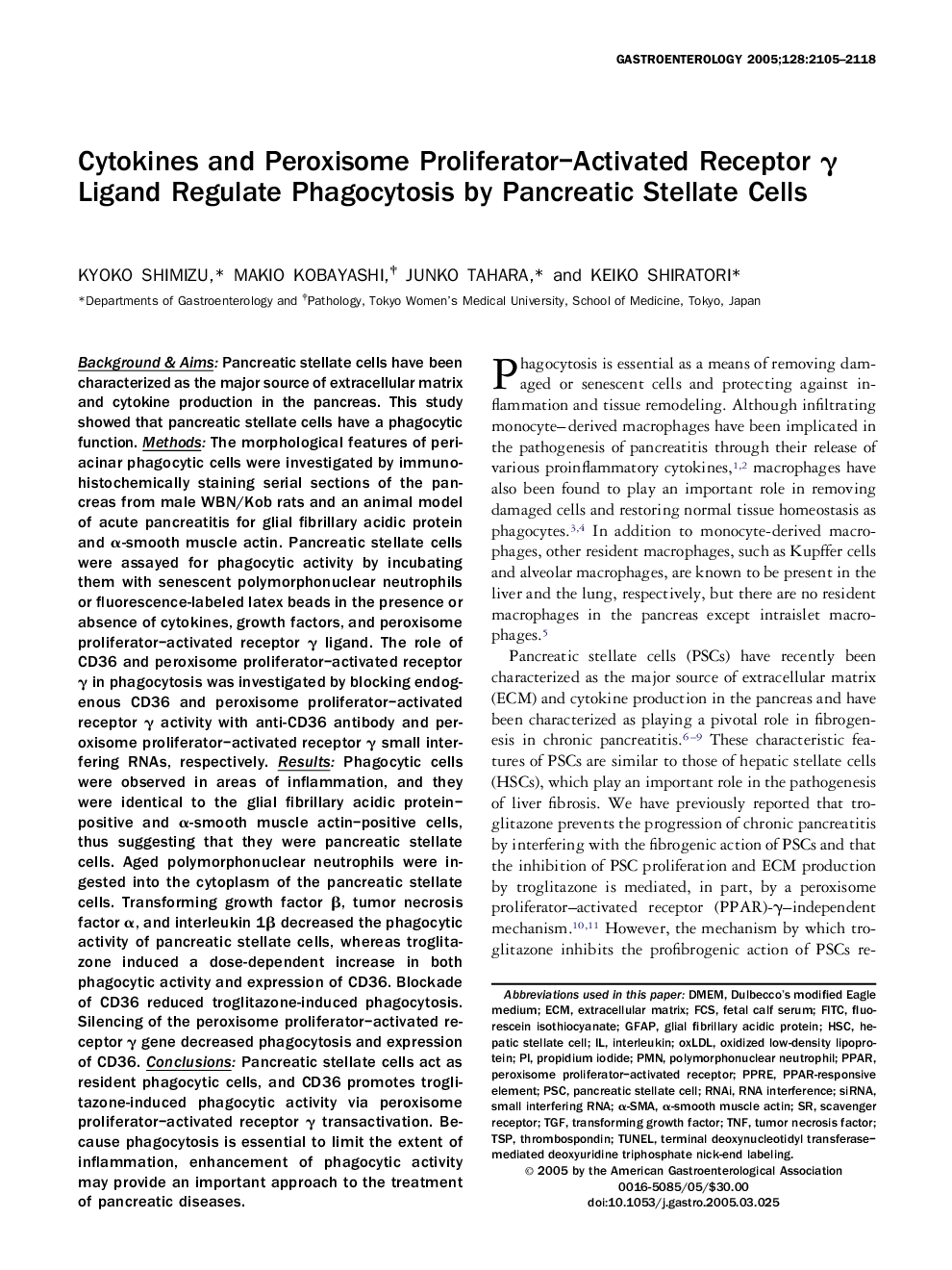| Article ID | Journal | Published Year | Pages | File Type |
|---|---|---|---|---|
| 3299744 | Gastroenterology | 2005 | 14 Pages |
Abstract
Background & Aims: Pancreatic stellate cells have been characterized as the major source of extracellular matrix and cytokine production in the pancreas. This study showed that pancreatic stellate cells have a phagocytic function. Methods: The morphological features of periacinar phagocytic cells were investigated by immunohistochemically staining serial sections of the pancreas from male WBN/Kob rats and an animal model of acute pancreatitis for glial fibrillary acidic protein and α-smooth muscle actin. Pancreatic stellate cells were assayed for phagocytic activity by incubating them with senescent polymorphonuclear neutrophils or fluorescence-labeled latex beads in the presence or absence of cytokines, growth factors, and peroxisome proliferator-activated receptor γ ligand. The role of CD36 and peroxisome proliferator-activated receptor γ in phagocytosis was investigated by blocking endogenous CD36 and peroxisome proliferator-activated receptor γ activity with anti-CD36 antibody and peroxisome proliferator-activated receptor γ small interfering RNAs, respectively. Results: Phagocytic cells were observed in areas of inflammation, and they were identical to the glial fibrillary acidic protein-positive and α-smooth muscle actin-positive cells, thus suggesting that they were pancreatic stellate cells. Aged polymorphonuclear neutrophils were ingested into the cytoplasm of the pancreatic stellate cells. Transforming growth factor β, tumor necrosis factor α, and interleukin 1β decreased the phagocytic activity of pancreatic stellate cells, whereas troglitazone induced a dose-dependent increase in both phagocytic activity and expression of CD36. Blockade of CD36 reduced troglitazone-induced phagocytosis. Silencing of the peroxisome proliferator-activated receptor γ gene decreased phagocytosis and expression of CD36. Conclusions: Pancreatic stellate cells act as resident phagocytic cells, and CD36 promotes troglitazone-induced phagocytic activity via peroxisome proliferator-activated receptor γ transactivation. Because phagocytosis is essential to limit the extent of inflammation, enhancement of phagocytic activity may provide an important approach to the treatment of pancreatic diseases.
Keywords
GFAPPPARPSCTNFFCSTSPTGFFITCDMEMPMNoxLDLHSCα-SMAECMDulbecco’s modified Eagle mediumRNA interferenceSmall interfering RNARNAisiRNAPPREα-smooth muscle actininterleukinterminal deoxynucleotidyl transferase-mediated deoxyuridine triphosphate nick-end labelingtransforming growth factorThrombospondinTUNELfetal calf serumHepatic stellate cellpancreatic stellate celltumor necrosis factorfluorescein isothiocyanateOxidized low-density lipoproteinExtracellular matrixpolymorphonuclear neutrophilGlial fibrillary acidic proteinPropidium iodideperoxisome proliferator-activated receptorScavenger receptor
Related Topics
Health Sciences
Medicine and Dentistry
Gastroenterology
Authors
Kyoko Shimizu, Makio Kobayashi, Junko Tahara, Keiko Shiratori,
